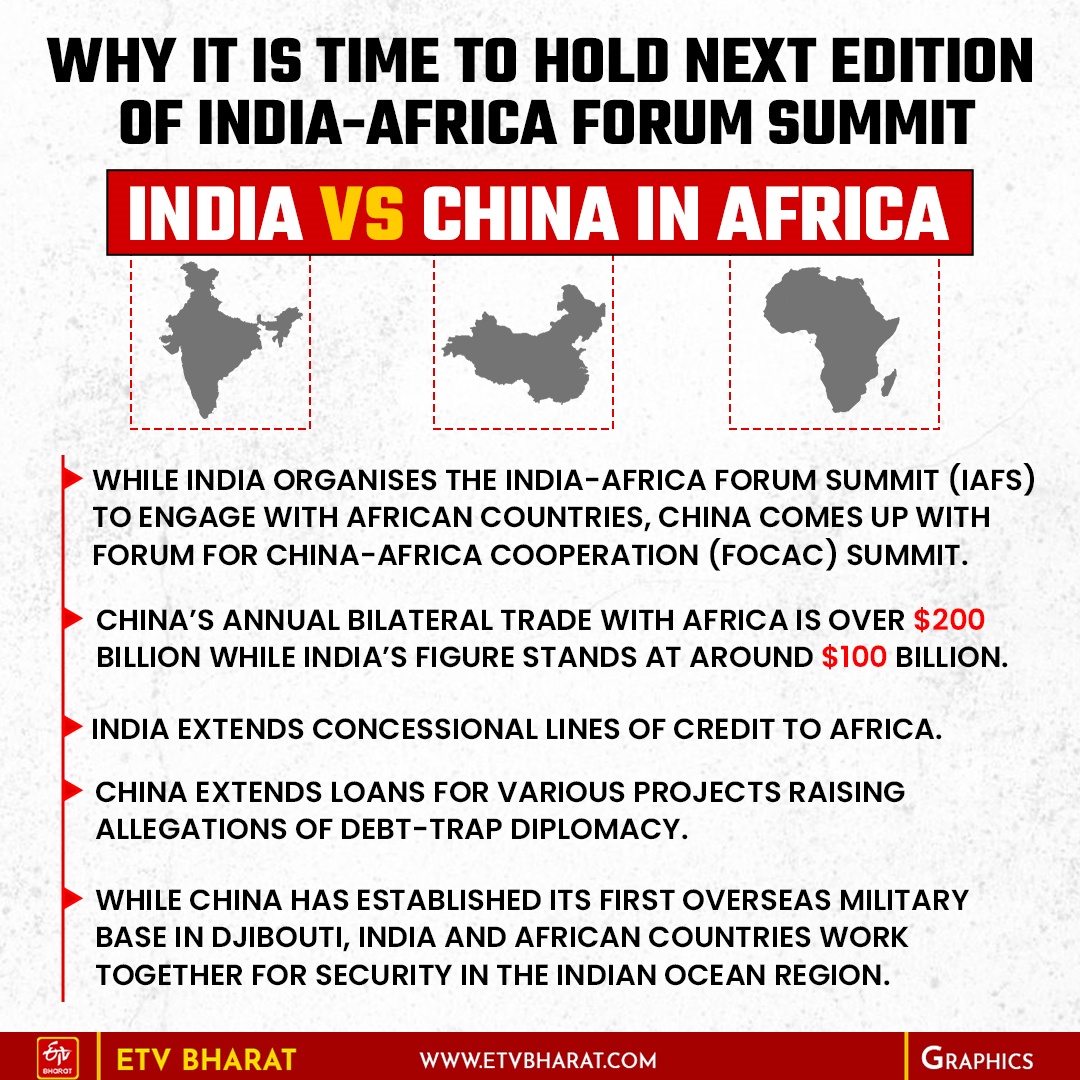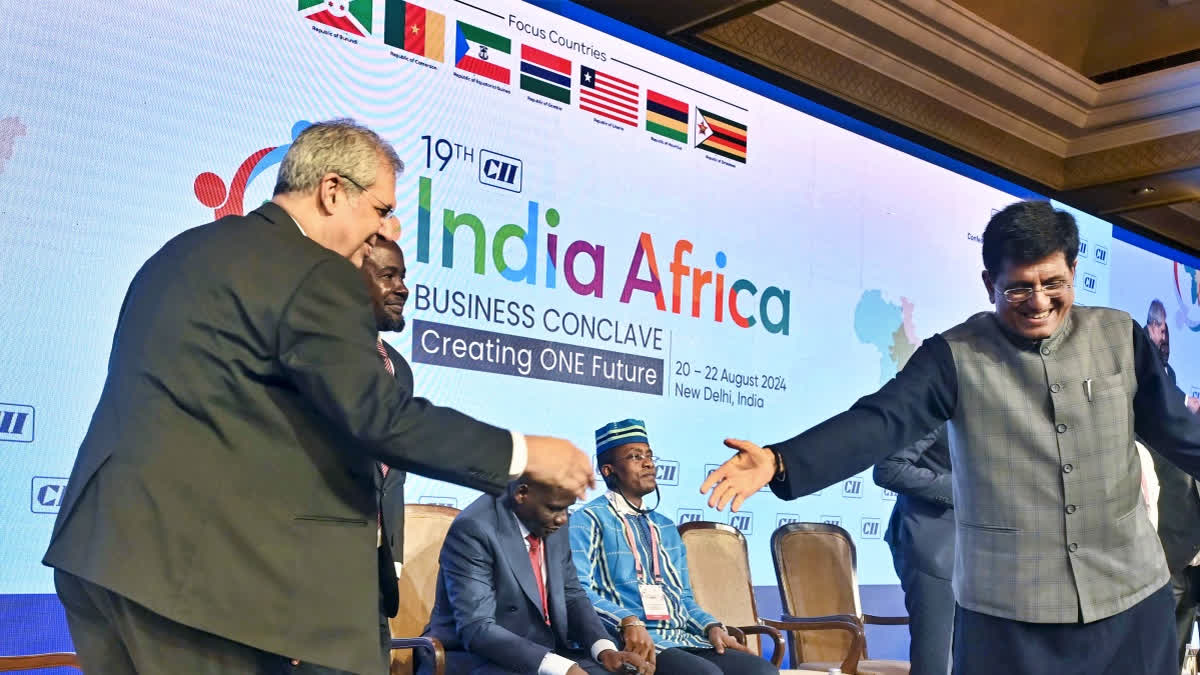New Delhi: Though India has positioned itself as the voice of the Global South and enjoys immense goodwill among African people, it is time for New Delhi to get more proactive if it wants to effectively counter China’s growing footprint in Africa.
This assumes all the more importance after China held the 2024 Summit of the Forum on China-Africa Cooperation (FOCAC) in Beijing this week. Delivering the keynote speech at the opening ceremony of the Summit on Thursday, Chinese President Xi Jinping announced 10 partnership initiatives to further boost bilateral relations between China and all African countries having diplomatic ties with Beijing.
He also proposed that bilateral relations between China and African countries be elevated to the level of strategic relations. To implement the 10 partnership initiatives, China will provide $50.7 billion to Africa over the next three years. The Summit also adopted the Beijing Declaration on Jointly Building an All-Weather China-Africa Community with a Shared Future for the New Era and the FOCAC-Beijing Action Plan (2025-27).

China’s modern engagement with Africa dates back to the 1950s and 1960s when it supported liberation movements and anti-colonial struggles. However, its significant push into Africa began in the early 2000s with the establishment of the FOCAC in 2000. This platform has been crucial in deepening China-Africa ties through regular summits, trade deals, and financial assistance. Held every three years, this year’s Summit was the ninth edition. Heads of government and state of 51 African countries and presidential representatives of two other countries attended the Summit.
This is yet another manifestation of China’s continuous efforts to increase its footprint in Africa and New Delhi will definitely take note of this.
According to Ruchita Beri, Senior Fellow at the Vivekananda International Foundation think tank and an expert on Africa, though China has been increasing its footprint in Africa, India too enjoys a lot of goodwill among Africans.
“However, India has not been able to fully cash in on this goodwill,” Beri told ETV Bharat.
India’s historical ties with Africa go back to the colonial era, marked by shared experiences of colonisation and the presence of a large Indian diaspora, especially in East and Southern Africa. Like the FOCAC, India too organises the India-Africa Forum Summit (IAFS), which is aimed at bolstering economic, political, and people-to-people ties. The first of these summits was held in 2008 in New Delhi, the second one was held in 2011 in Addis Ababa, Ethiopia, and third one again in New Delhi in 2015. However, after 2015, no such summit has been held till date. Though a fourth edition of the summit was supposed to be held in 2020, it got postponed due to the outbreak of the COVID-19 pandemic.
However, India has been taking other initiatives to keep its engagement with Africa going. During his visit to Uganda in 2018, Prime Minister Narendra Modi announced 10 guiding principles for India’s engagement with Africa. These include: prioritising Africa in India’s foreign policy; guiding development partnerships based on African priorities; promoting trade and investment; exporting India’s digital revolution; cooperating in agriculture; addressing climate change; combatting terrorism and extremism; ensuring maritime security; promoting global engagement and reforming global institutions; and ensuring greater representation for Africa.
Beri also pointed out that in 2022, the India-Africa Defence Dialogue (IADD) was held on the sidelines of DefExpo 2022 in Gandhinagar. Over 50 African countries participated in the event. Delivering the keynote address, Defence Minister Rajnath Singh stressed on the underlying commitment of India and African countries to explore new areas of convergence for defence engagements, including capacity building, training, cyber security, maritime security and counter terrorism. He termed India and African countries as important stakeholders in ensuring a safe and secure maritime environment, especially in the Indian Ocean Region. He pointed out that the two sides work together in many regional mechanisms, which foster inclusive and constructive collaboration in dealing with shared security concerns and address common challenges to peace and prosperity.
China, meanwhile, has increased its military presence in Africa, notably through its first overseas military base in Djibouti. China has also been active in UN peacekeeping missions, being one of the largest contributors of peacekeepers in Africa. Chinese arms sales to African nations have also grown, positioning it as a key security partner for several countries.
In June this year, the CII-EXIM Bank Conclave on ‘India-Africa Growth Partnership’ was held in New Delhi. Addressing the Conclave, Commerce and Industry Minister Piyush Goyal said that the bilateral trade of India with Africa grew by 9.26 percent in FY 2022-23 reaching almost $100 Billion. He said that the exports and imports were approximately balanced with exports being $51.2 Billion and imports being $46.65 Billion in FY 2022-23. He expressed confidence in achieving the goal of doubling the trade volume to $200 billion by 2030.
Then again, last month, addressing the CII India-Africa Business Conclave held in New Delhi, Goyal urged the least developed countries (LDCs) of Africa to strive for better utilisation of the Duty Free Tariff Preference (DFTP) scheme offered by India. He opined that greater participation of African LDCs in the India-Africa bilateral trade will result in more equitable trade and facilitate a wider participation of the African economies.
Referring to India’s achievements in the area of digital public infrastructure, Goyal called for employing India’s expertise and experience to augment Africa’s digital transformation with beneficial outcomes in areas like fintech, healthcare among others. He also underscored the opportunity for deeper India-Africa bilateral partnerships in areas like critical minerals, entertainment, and added that technology-led cooperation in agriculture will also strengthen the food security of both regions.
However, the fact of the matter is that China remains Africa’s largest trading partner, with trade volumes surpassing $200 billion annually. Its investments span various sectors, including infrastructure, mining, energy, and telecommunications. China has financed and constructed numerous projects, such as roads, railways, ports, and power plants, as part of its Belt and Road Initiative (BRI). Chinese state-owned enterprises and private companies have established a strong presence in Africa, often backed by Chinese loans and investments raising allegations of debt-trap diplomacy from various quarters.
India’s economic engagement with Africa, on the other hand, is driven by private-sector investments and government-backed initiatives focusing on information technology, pharmaceuticals, agriculture, and small and medium-sized enterprises. India has also provided concessional lines of credit to African nations, financing projects in areas like power generation, transportation, and education.
Last year, during its presidency of the G20, India earned immense goodwill from Africa after it brought the African Union on board the inter-governmental forum. Also, since assuming the presidency of the G20, India has been hosting the Voice of the Global South Summit (VOGSS) which sees the participation of all African countries. Till date, three editions of the VOGSS have been held during and after India’s G20 presidency. The last VOGSS was held in August this year.
“However,” Beri pointed out, “the VOGSS is held only in the virtual mode.” It is the IAFS that is the chief political institutional mechanism between India and 54 countries of the African continent. The last IAFS in 2015 saw the participation of all 54 countries, including 40 heads of state. “It is high time that the next edition of the IAFS is held,” Beri said.



